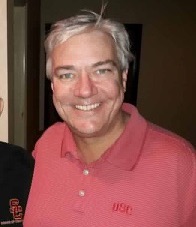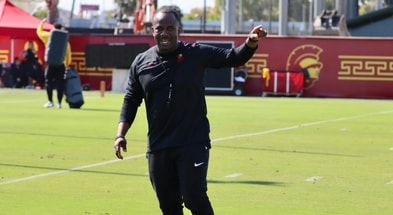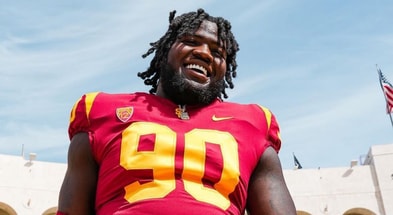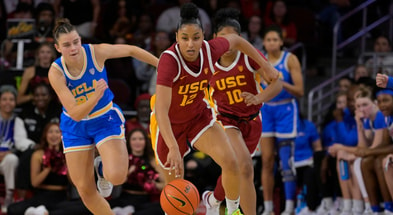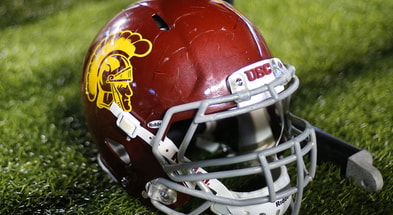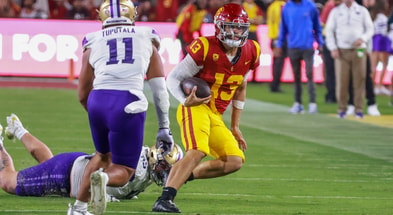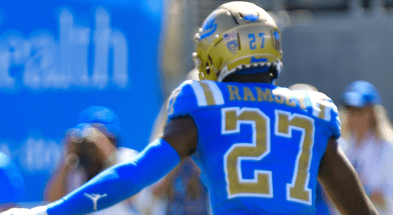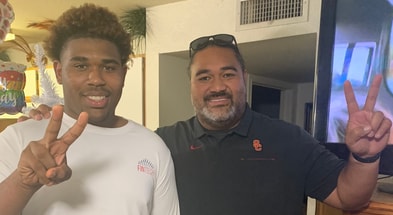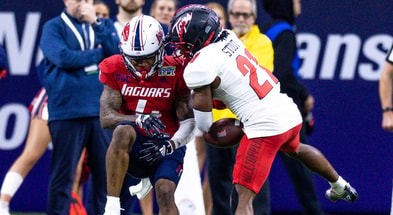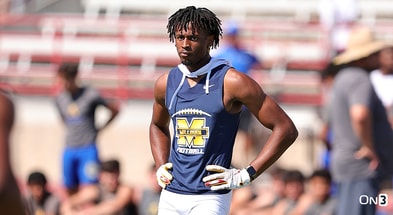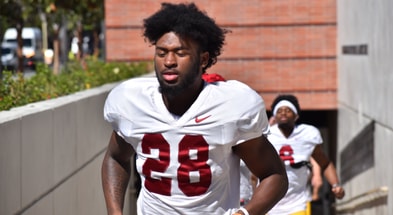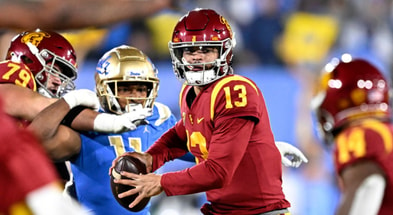by Garry Paskwietz
WeAreSC sat down with Dr. Magdi El-Shahawy, a senior associate athletic director at USC and director of the Student-Athlete Academic Services program. Dr. El-Shahawy came to USC in 20000 after stints in the Florida State and Michigan State athletic departments. He also played defensive line at Florida State from 1986-89 (Deion Sanders was a teammate) where he earned a bachelor’s degree, a master’s degree, and a Ph.D.
WeAreSC: For those who don’t know, give a thumbnail description of your job.
El-Shahawy: I have oversight of all our student-athlete support services such as academic support, personal development, student services such as housing and meal plans, basically anything a student-athlete needs. I also serve as the sport administrator for the track & field and baseball programs. Initially I handled men’s volleyball in 2007, picked up track in 2010 and then last year I picked up baseball and stopped doing volleyball.
WeAreSC: Hearing stuff like the meals plans and housing, I think that would surprise people who think your department is strictly academic services.
El-Shahawy: It’s certainly part of our oversight on a day-to-day basis, I have two people on staff who report to me who specifically focus on student services. Where I’m probably most hands-on myself is with the personal development - the athlete career transition program - and academic support for football and men’s basketball.
WeAreSC: Talk to us about the athlete career transition program.
El-Shahawy: We really ramped that up about 5-6 years ago with thinking how to get ahead of the curve with exposing out student-athletes to resources like networking panels, doing our own career fairs and intern fairs. We bring former student-athletes who are involved in a variety of different careers to talk to our current student-athletes about what they do, set up informational interviews. We have a committee that meets every two weeks to talk about how we can tie more people in, how we can facilitate more internship opportunities or entry-level jobs. It’s not just current student-athletes, we offer this to former student-athletes as well if they are interested in meeting people from a certain industry, try to offer anything we can to help get their foot in the door.
WeAreSC: I think this program can be as important as anything because part of the reason why you come to a school like USC is to take advantage of those resources.
El-Shahawy: Yeah, we’ve always had a life skills program or career program but we’ve taken it to another level. We’re getting ready to have a networking dinner for our football team with 30 individuals from different careers, and we will look to pair up guys with people from careers they may be interested in. We do a summer personal development program with athletes who have finished their classes but are still training. There are 18 guys right now from the football team in the program and we do everything from mental health, leadership, substance abuse, nutrition. We just had Jody Adewale as part of our speaker series, he’s a sports psychologist therapist and he talked about what he does on a day-to-day basis, we had Anthony Daye who is now an attorney, LaJuan Ramsey is a chef, just a whole host of guys. These are guys who played here so they can talk about maximizing their experience, what they would have done different. One consistent message I’ve heard is that if guys had it to do over again they would have forged more relationships with students on campus outside of sports. They talk about what some of their classmates are doing now, some pretty accomplished people, and how that could benefit you down the road to have those contacts. It’s something you understand as an older person but when you’re 18-22 it’s not always at the top of your mind so it helps to have it reinforced from someone who was recently in their place.
WeAreSC: You have a unique perspective as a former player, and now university administrator, to understand how all of these things play together in the development of the student-athlete.
El-Shahawy: I like to think I have the ability to relate to what any of our student-athletes are doing. I’ve been doing this a long time, since shortly after I was one, so I’ve been dealing basically with a similar age group for 30 years now.
WeAreSC: Do these players know about your background? Those teams you played on at Florida State bring a certain amount of cache.
El-Shahawy: It’s been a while. I was thinking about it the other day, I have my 30th high school reunion coming up and I tried to think about how I would have viewed that when I was in high school, it would have seemed ancient. The guys 30 years before me were the old days when they didn’t even have facemasks.
WeAreSC: Is this what you wanted to do as a career?
El-Shahawy: It certainly isn’t what I came to college thinking I would be doing at this stage of my life. I don’t know if I chose the career or the career chose me, to some respect. It wasn’t until shortly after graduation when I had a chance to go back and get a masters and a graduate assistant spot in the athletic department. A full-time job opened right when I finished my masters so I figured, it’s a job. Then one thing led to another and now I’m here.
WeAreSC: One of the things that has been noticeable at USC in recent years is how many players are working on advanced degrees while still playing their sport.
El-Shahawy: We’re seeing more and more where student-athletes across all sports are staying here for the summer to prepare for the fall. It’s always kind of been the expectation that football players are here for the summer but now it’s all sports. The byproduct of that is, if you take two courses each summer, assuming you come in the summer before your freshman year you will have taken a whole extra year of classes by the start of your fourth year. It’s a great way to stay on track or to accelerate your graduation track and get started, or even finish work on a masters program. Right now we have three guys in the NFL (Devon Kennard, Khaled Holmes and Rhett Ellison) who had master’s degrees before they left USC.
WeAreSC: How early do you start laying out that potential academic track to show what options are available?
El-Shahawy: Without giving any names we have a freshman in track coming in today who we have to anticipate may have the opportunity to go professional, maybe could have done it already, so we had a candid conversation about what he could do to get on a three-year track. Even if he only ends up here two years, he could end up only having two more semesters of college to get his degree. If we have a football player and you know he may not be here four years but he is an achiever and gets things done, you have that candid conversation. And there are times where it could be a difference for a student choosing to stay a fourth or fifth year, to get that masters. We break it down for them all time in terms of value, a year-round scholarship with summer school is probably worth around $80,000 so you’re talking about something that in four years is over $300,000 worth of education.
WeAreSC: How do you put that value in perspective for a current student-athlete, many of whom are focused on professional aspirations in their sport?
El-Shahawy: A lot of the families understand the value but it’s important to us that the kid understands what it means for them. I remember when I was being recruited, maybe one out of 10 showed up with family on a recruiting trip, we kind of came into college a little more independent. Now it’s one out of 10 who doesn’t come with their family, and it’s the family asking all the questions.That’s a unique thing I’ve seen change overnight since I’ve been in this business.
What we do is we don’t use the word career when talking about a sport. A career is something you can do until your 70. Pro sports is something you’re lucky to do until you’re 30. And in those cases, pro sports is often a career handicapper, not a career enhancer. Let’s say you’re in the league for 3-4 years, which most of our guys are, and then you spend another year or two trying to make another team, then you’re 28 or 29 years old and you’re retired. And you’ve spent all those years focused primarily on that one goal but what have you done to prepare yourself for the next 40 years? You may have made some money in the NFL but unless you’re in that 10% of earnings you don’t have a lot of savings. Now you have to go to a job that won’t be six figures, you’re working a 40 or 50 work week, there’s a psychological adjustment there, a lack of preparation for the real world. So we really spend a lot of time talking about that transition and trying to get ahead of it.
WeAreSC: It’s amazing how many resources are there these days for support of a student-athlete.
El-Shahawy: We have to be careful not to do too much. We have to make sure we’re fostering independence. All that support needs to be geared toward letting the kid experience it, and sometimes if they fall they will learn faster. There are so many different factors that go into it for each kid when they come here, from parenting to school background to country, social norms. Every kid is different and it’s up to us to find out where each one is at.
WeAreSC: How are you brought into the recruiting process?
El-Shahawy: My staff is involved quite a bit. It may be a counselor, a learning specialist, someone from our group is meeting with pretty much all the prospective student-athletes. I will meet with a good number as well, primarily for the sports that I’m an administrator for.
WeAreSC: How big is your staff and how much has your role changed as an administrator of that group?
El-Shahawy: We’ve got a 20-person staff. When I first got here my focus was on academic support and personal development, and there were 12 people at the time so we’ve nearly doubled as we’ve added on in those areas and included professional development as well. In my case, I know I can’t do it all myself so I have people on my leadership team, kind of like an athletic director has a senior associate athletic director. That allows me to spend time also in my role as sport administrator, to see to the needs of track and baseball, and also to hopefully serve more on the global senior leadership team in the athletic department.
WeAreSC: I know you probably haven’t had much of a chance to view Lynn Swann in his new role but what are your impressions of what you’ve seen so far?
El-Shahawy: I think Lynn has come in and asked a lot of the right questions. One thing I’ve seen him do with the senior leadership team is do a lot of asking. You can see he’s absorbing what’s going on and he wants to set as a hallmark the well-rounded college experience for the student-athletes. It’s been nice to see we haven’t deviated from that because Pat (Haden) was like that as well.
WeAreSC: Talk about how you’ve worked with Clay Helton as he takes over the football program.
El-Shahawy: I know you hear everyone say, oh this guy is the greatest, but from a student-development and academic perspective he’s probably the best I’ve ever seen from a head football coach. He cares about the kids beyond the game. And I’m not saying anyone hasn’t before, but to another level. He sat in classes with his incoming freshmen this summer, I’ve never seen a head coach do that. He’s talked to our personal development program about maximizing their time at USC and not just staying in the athletic bubble. He talks to them about the importance of consistently making good decisions. When he got the job he talked with the whole department about his philosophies and beliefs, and he talks a lot about setting a culture of respect. He’s just a solid Christian man and you want to see guys like that win, you really do.
Garry Paskwietz (1966-2019)
Garry Paskwietz was a pioneer in bringing team-specific sports coverage to the internet. He founded WeAreSC in 1998 and was an Emmy winner for his work with Fox Sports West. Always generous with his time, knowledge, and compassion, he touched the lives of countless USC and high school football fans.
